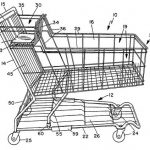Some of the most significant environmental problems of our time result from the collective impact of individual consumption decisions. We decide what to eat, what to wear, how to heat and cool our homes, how to transport ourselves, and what products to buy. But there are multiple ways for Christians to address the environmental, social, and personal costs of consumption. (Illustration: V. John Ondrasik, Shopping Cart, United States Patent #716871)












